Key takeaways:
- Reparations politics involves addressing historical injustices, and it’s essential to foster a societal conversation that acknowledges pain while promoting dignity and respect.
- Legislation is critical for formal recognition of historical wrongs, shaping public consciousness, and providing transparency in the reparations process.
- Community engagement is often sidelined in legislative processes, highlighting the need for inclusivity to build trust and ensure effective reparative measures.
- Advocacy for reparations can be strengthened through collaboration, personal storytelling, and coalition-building across diverse groups to amplify the message and influence policymakers.

Reparations Politics Overview
Reparations politics is a multifaceted and deeply emotional topic that seeks to address historical injustices faced by marginalized communities, particularly descendants of enslaved people. I often find myself reflecting on the implications of reparations, pondering questions like, “How do we begin to quantify suffering and loss?” This complexity makes the conversation all the more vital, as it involves not just the distribution of resources but the acknowledgment of a painful legacy.
One of the most challenging aspects of reparations politics is navigating the varied public opinions on the issue. I remember attending a community forum where the room buzzed with diverse perspectives. Some participants passionately championed reparations, sharing their own family histories, while others expressed skepticism, questioning whether financial compensation could ever truly heal generational wounds. This dynamic illustrated a crucial point: reparations aren’t solely about money; they represent a fundamental shift towards recognizing dignity and restoring respect.
In exploring reparations, it’s essential to understand that this isn’t simply a legislative issue; it’s a societal conversation that can evoke strong emotions. Consider how different communities might react to proposals for reparations. For instance, when I hear stories of individuals who have benefited from systems that sustained racial injustice, I can’t help but wonder about the impact of these structures. Are we ready to confront our past and pave the way for a more equitable future? This dialogue is crucial for fostering understanding and finding a path forward.
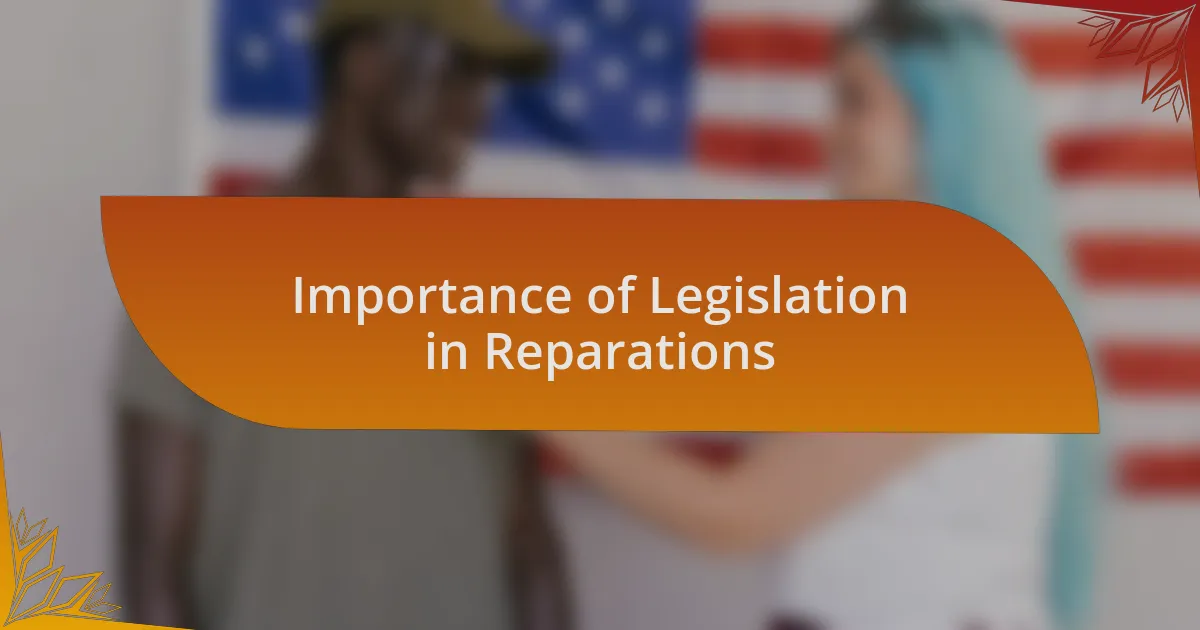
Importance of Legislation in Reparations
Legislation plays a pivotal role in the reparations movement as it serves as the formal recognition of historical injustices. I recall a meeting with local activists where we discussed various proposed bills aimed at creating reparative frameworks. It struck me how essential this legal backbone is—not merely for establishing financial compensation but for solidifying a societal commitment to rectify past wrongs. Without legislation, the promises of reparations can easily fall into the realm of empty rhetoric.
Moreover, legislation can act as a catalyst for broader societal change by shaping public consciousness. I often think about how landmark laws, like civil rights legislation in the 1960s, altered the landscape of social justice. When we create laws that explicitly address reparations, we force society to confront uncomfortable truths. Isn’t it intriguing how legal recognition can bring legitimacy to the narratives of those who have suffered? This acknowledgement can pave the way for public discourse that transforms understanding and empathy.
Additionally, effective legislation can outline clear frameworks for reparations, making the process transparent and accountable. In my experience attending community discussions, I’ve seen how people yearn for clarity and direction regarding reparations. Ambiguity tends to breed distrust; without a transparent legislative process, individuals may question the sincerity of the reparative effort. By establishing robust legal guidelines, we not only honor the struggles of the past but empower individuals to envision their rightful future. Isn’t it essential that we create structures that promote healing, rather than perpetuate uncertainty?
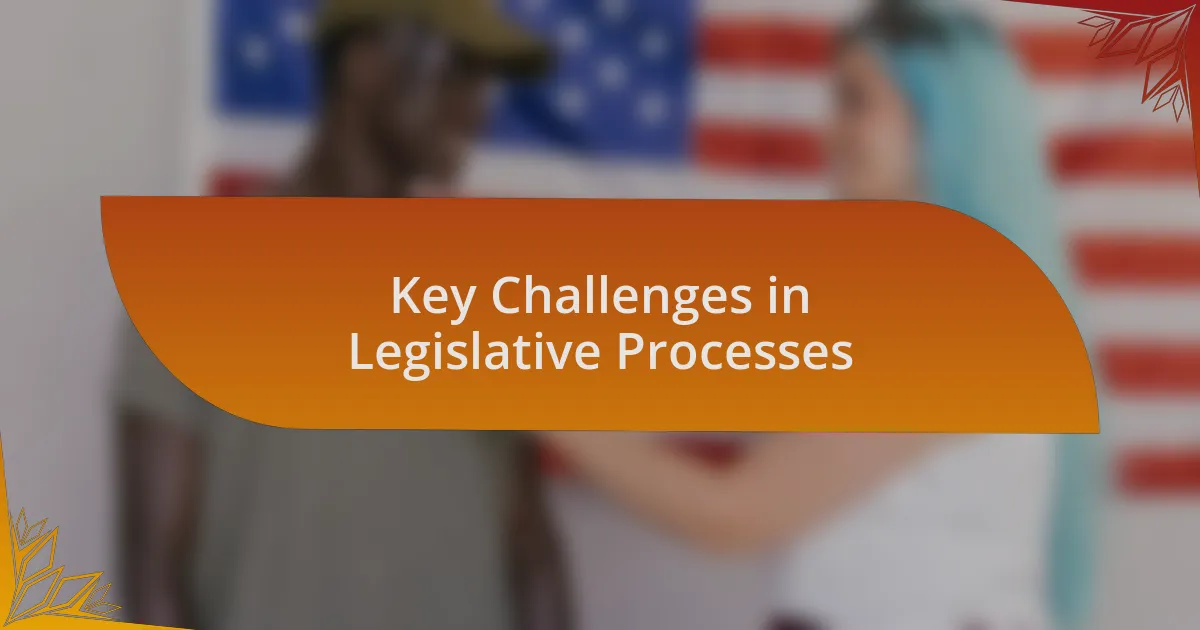
Key Challenges in Legislative Processes
Navigating the legislative landscape involves significant hurdles, particularly when it comes to reparations. I remember sitting in a hearing where passionate testimonies encountered political stalemate. It made me realize that competing interests often derail progress. How can we push forward meaningful change when lawmakers are tethered to party lines and special interests? This dynamic can stifle essential conversations about reparative justice.
One of the more frustrating aspects I’ve observed is the tendency for proposed legislation to be diluted under intense scrutiny and fear of backlash. During discussions with fellow advocates, I felt the weight of our collective hopes resting on these bills. It’s disheartening to see well-intentioned measures transform into vague proposals that lose their intended impact. Have you ever felt that tension between aspiration and reality? It’s a poignant reminder that without courage, the potential for real change can slip away.
Furthermore, I often find myself reflecting on how community engagement gets sidelined in the legislative process. In meetings, I’ve seen constituents deeply passionate about reparations, yet their voices often feel muted or ignored. Isn’t it critical that we incorporate these perspectives into the creation of laws? When the community feels excluded, the result can be skepticism and apathy toward the very legislation designed to benefit them. Engaging people genuinely can empower not just the process but the outcome, fostering trust in reparative efforts.
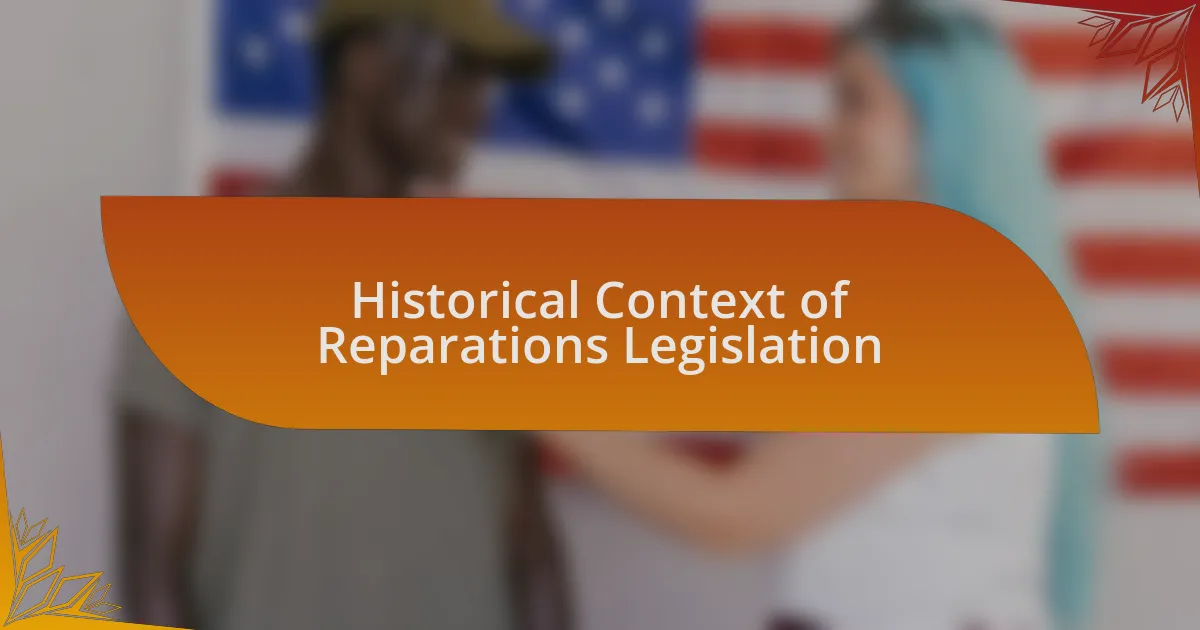
Historical Context of Reparations Legislation
Understanding the historical context of reparations legislation is crucial to grasping today’s discussions. I recall a discussion I had with an elder in my community who recounted the injustices faced during segregation. These narratives highlight how the legacy of slavery and systemic racism has shaped the call for reparations—it’s not just a recent demand but a response to centuries of oppression and denial of rights.
In studying past legislative efforts, I often feel a mix of frustration and hope. For instance, the Civil Liberties Act of 1988, which provided reparations for Japanese Americans interned during World War II, serves as an important precedent. It makes me wonder, why hasn’t a similar recognition and redress been extended to African Americans? The stark contrast between these historical actions underscores the ongoing struggle for reparative justice.
Moreover, I can’t help but reflect on the complexity of public perception regarding reparations. In conversations with friends, I’ve encountered a range of opinions—some understand the need for reparations, while others dismiss it as unnecessary. How do we bridge this divide? Addressing these differing perspectives is essential if we wish to build a comprehensive understanding of reparations legislation.
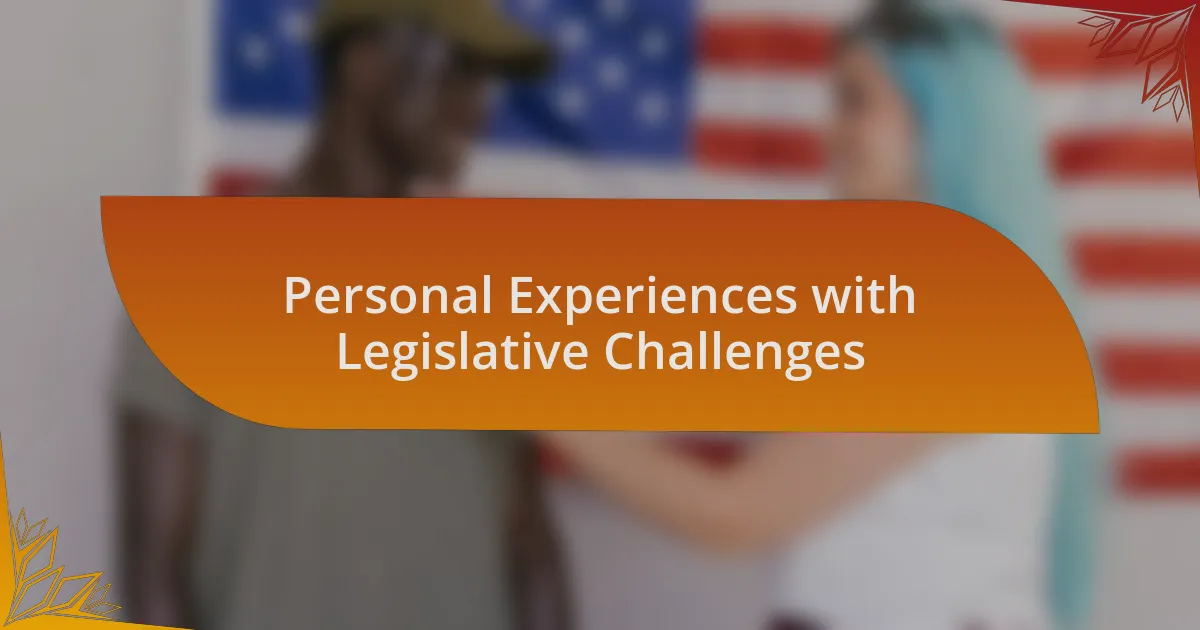
Personal Experiences with Legislative Challenges
Navigating the legislative landscape surrounding reparations has been challenging for me, especially when attending local town halls. I vividly remember the tension in the room during a heated discussion about potential reparative measures for our community. I felt a mix of passion and hopelessness as people debated passionately—some sharing personal stories while others pushed back, insisting it wasn’t the right time or place for such talk.
One poignant experience I had was volunteering for a grassroots organization advocating for reparations. The obstacles we faced were daunting; from securing funding to confrontational encounters with political leaders who were resistant to even consider our proposals. This made me question, what drives the reluctance to acknowledge such a crucial aspect of our shared history? I realized that these challenges often stem from deep-rooted fear of change and misunderstanding of what reparations truly entail.
Reflecting on these experiences, I often ponder how much more effective our advocacy could be if we focused on building empathy rather than just arguing policy. I’ve learned that sharing personal stories can shift perspectives, but that requires vulnerability—something some people are hesitant to embrace. How do we cultivate a space for these conversations? It’s clear to me that fostering genuine dialogue about the past is essential to breaking down the barriers we face in legislative reform.

Insights on Navigating Legal Hurdles
When confronting legal hurdles in reparations politics, I’ve often found it helpful to emphasize collaboration over confrontation. During a strategy meeting with fellow activists, I noticed how sharing our unique experiences not only enriched our discussions but also helped us unify our vision. It made me think: how can our diverse narratives strengthen our fight for justice, rather than fragment it?
I recall a specific instance when our team prepared to present a proposal to the city council. We faced skepticism from officials who were unconvinced about the value of reparations. That day, we decided to bring in community members directly affected by historical injustices to speak. Their authenticity cut through the red tape in ways that statistics simply could not. Reflecting on this, I realized that personal testimonies can be powerful tools in dismantling legal barriers.
Navigating the complex legal landscape also requires us to anticipate resistance. I learned that understanding the opposition’s concerns is crucial for effective advocacy. For instance, discussing potential economic implications of reparations helped open dialogues with those who are usually opposed. It begs the question: what if we shifted our framing to highlight reparations as an investment in our community’s future? That approach not only addresses fears but also invites collaboration.
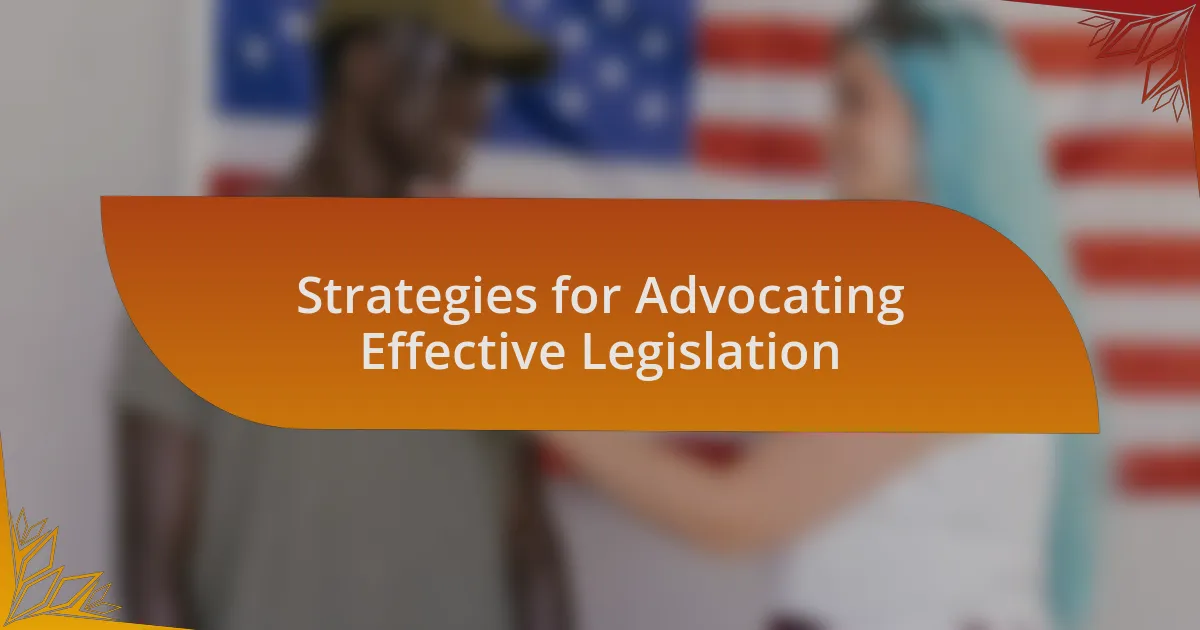
Strategies for Advocating Effective Legislation
Advocating for effective legislation in reparations politics often hinges on grassroots mobilization. Reflecting on my experience at a local town hall meeting, I felt the palpable energy when community members lined up to voice their support. It made me question, how can we continually harness that enthusiasm to influence policymakers? The raw emotion in those voices left a mark on the decision-makers, reminding me that collective advocacy is a formidable force.
Engagement with policymakers is another critical strategy. While preparing for a discussion with state legislators, I remember crafting a narrative that framed reparations as a moral obligation intertwined with economic justice. I found that presenting compelling data alongside personal stories fostered a deeper understanding among lawmakers. Could it be that our narratives serve not just as emotional appeals but as a bridge to rational discourse? It’s a delicate balance, and I’ve learned that presenting both angles can foster genuine conversations.
Finally, I’ve realized that building coalitions across different advocacy groups amplifies our message. At a recent coalition-building workshop, it struck me how our shared goals, though diverse in focus, could create a more robust advocacy front. How often do we miss opportunities for synergy because we remain siloed in our efforts? Strengthening these alliances not only broadens our reach but also enriches our perspectives, making our legislative push more compelling.